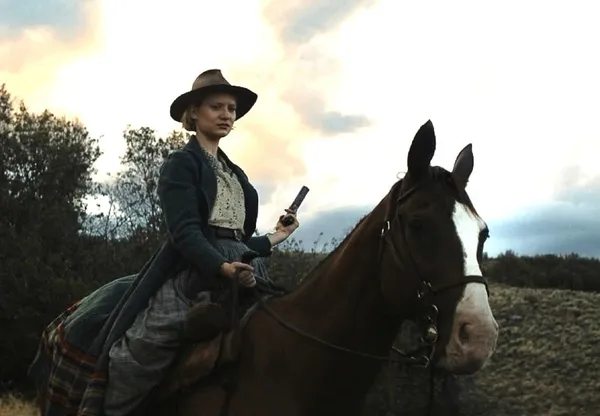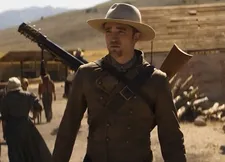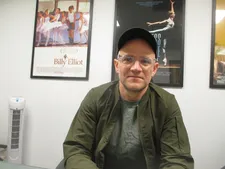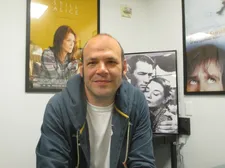In the second part of my Wild West conversation with David Zellner and Nathan Zellner on Damsel, we explore Robert Pattinson's role as Samuel Alabaster, casting him against type as Alfred Hitchcock did with Sean Connery for Mark Rutland in Marnie, the strength of Mia Wasikowska's Penelope, Ricky Nelson in Howard Hawks's Rio Bravo, working with The Octopus Project (Josh Lambert, Ryan Figg, Yvonne Lambert, Toto Miranda) on a cowboy ballad, getting a fresh start, and giving your best shot at following the Code of the Prairie.
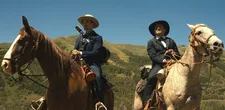 |
| David Zellner (here as Parson Henry) on Robert Pattinson's Samuel singing Honeybun in Damsel: "We like it when there's cowboy ballads." |
Anne-Katrin Titze: The song "Honeybun", you composed that yourself?
David Zellner: Yeah, it was in the script. We like it when there's cowboy ballads. We're just as influenced by music as we are by other films. So we liked the idea of a little musical sequence.
AKT: Can you sing a few notes?
DZ: I can't, my voice …
AKT: How about you?
Nathan Zellner: Oh, no, no, no. But it is funny because David came up with the idea and just like recorded it on his phone and then I think we wrote it down. And we worked with Josh [Lambert] and the Octopus Project to come up with the melody.
AKT: Some of the traditional Western movie cowboy songs are so absurd. I was thinking of My Rifle, My Pony and Me, for example. It's about "my three good companions" and you wonder, "me" is my third companion?
DZ (laughing): That's funny! That was a big inspiration for us. I love Ricky Nelson.
AKT: Rio Bravo?
DZ: Yeah, particularly Ricky Nelson in that. That song in that part of the movie is so great because they're just hanging out. A lot of the time in movies they show part of a song. I liked that they played the whole song. And in that one it's so gutsy because they play two songs in a row. It's so weird. They have the whole song. And they finish it. "Hey, that's good, let's do another song." And then Ricky Nelson sings a whole second song in that scene. I always thought that's fantastic.
AKT: The idea of a fresh start that your character [David as Parson Henry] is obsessed with, happens based on somebody else's past with somebody else's costume.
DZ: Oh wow, that's true. You're … These are all very good observations. There are a lot of things that are kind of relatable on a contemporary level. You can think of it in contemporary terms. Whether it's someone having a fresh start or any kind of relationship. Where you don't really think about it historically. You know, everybody has had those since the beginning of time. But this notion, everything will be fine if I just obtain this, or just get this, or do this and this whole fresh start.
And then on an individual level it was interesting to us with the characters but also just in the context of the Wild West. With the whole notion of western expansion. It's like things suck for me on the East Coast but if I go into the wilderness, things will magically be better. That was a dynamic from the outset that we wanted to play with.
NZ: It seemed like that when we started thinking about it, I mean, growing up learning about the history of the West in school and stuff like that. And then when you think about it, to make that choice, to leave on these month-long wagon trails and treks and in search of fool's gold and all that. In order to do that you had to be escaping something or crazy. Or just had no other choice. So that was a fun dynamic to play with.
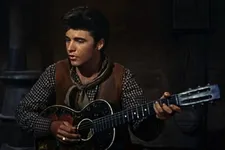 |
| David Zellner on Ricky Nelson singing My Rifle, My Pony And Me in Rio Bravo: "That song in that part of the movie is so great because they're just hanging out." |
AKT: And that the whole country is based on that!
NZ: Exactly.
AKT: Think about that now! Crazy from the start.
DZ: And it all came to this, where we are today.
AKT: And Nathan, your character's surprise resurrection makes him [Rufus Cornell] want to follow the Code of the Prairie. Great classic name for the heroine, by the way, Penelope.
DZ: Yeah, that was an accident. The whole time when we shopped the script around and then when we made the movie no one saw that connection. But it's been funny that in Q&As people thought that it's from the Odyssey.
AKT: Exactly, that's what I was thinking.
DZ: That was just an accident. We're not that smart.
AKT: I doubt that. All these suitors around, trying to - not even rescue her, just own her.
DZ: Yeah, there's no interest or consideration for what she needs or what she wants. It's all kind of based on their projecting their image onto her what they want.
AKT: I liked that you also show the situation she is in. You feel very much, there she is, a woman all alone under these circumstances. What a horrible situation. All her strength shines through. It's not just a joke.
DZ: Yeah, that was important to us.
AKT: And Mia [Wasikowska] is really great.
DZ: Oh thank you. We're so happy. She was amazing. The film has a lot of stylization to it. From the kind of mythic quality of the West, but we like the idea of grounding in a certain dimension of complexity to the characters so that there's more to them than archetypes or something. So that when things happen, there's a weight to it.
So with her - there's a different version of this film where what happens in the middle could be at the very end. And then just end. And we liked the idea, something like, what happens after the climax? What's the mess that people have to clean up? You're kind of left with the emotional burden of all that.
AKT: Was there a kernel scene at the beginning? One scene you had in your head from which it all blossomed?
DZ: It's a combination of individual ideas that are out of context. You could say like the horse and the chicken. The kernel narratively, the middle, that was kind of what started it. That confrontation, or showdown, was kind of the impetus for it all.
But we always knew we wanted it in the middle. And that we'd try something structurally different from like a typical three-act structure that's more like two halves. Both in terms of whose point-of-view the story and also like on a really simple level, the idea of starting at the ocean, going up to the mountain, and then going down. Everything is kind of balanced in there.
AKT: I didn't catch that - just the return to the ocean.
DZ: I mean it's not a big plot point.
AKT: Hitchcock was casting Sean Connery in Marnie as the rapist because of his past films and the whole allure he had. And I was thinking of your casting of Robert Pattinson and his allure from previous films that you took into account. How much that influences what we project onto him.
DZ: It was very calculated. It was two things. You cast first and foremost someone that you want to work with and that's appropriate for the role. But then looking contextually in terms of what they've done before and what people will be going into the movie with before the first frame even. We liked the idea and that was something he liked too.
I think that was what drew us to him, as he was looking to do things that were new to him. And we wanted to cast someone that had never played a role like this before. Both he and Mia. Even if you love an actor and have seen them in the same thing before, you know what to expect. And we wanted that to not be the case. It was fun having someone where there's a certain familiarity with the actor from the outset but you're getting it in a different way than what you've seen before.
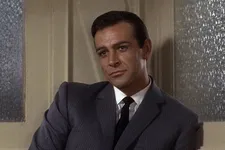 |
| Sean Connery as Mark Rutland in Alfred Hitchcock's Marnie |
NZ: The first part of the film is from Samuel's point of view. You're relying on him for all your information. And having Rob's history and people's familiarity with him really lent itself all to the unreliable narrator aspect of it. Because you're already picturing what he should be seeing, what he should be doing. So everything that he says is believable, the way he is presenting himself.
DZ: Well, from his perspective it is the truth. So it's playing with people's different variations of what the truth is.
AKT: That's where I could tie it back to Slavoj Žižek [in The Pervert's Guide To Ideology], where he says all fantasy is a lie.
DZ: Oh wow! I think that's a thing that I like in general, the kind of eternal conflict between people's expectations of the way things should be in the world versus how the universe actually is. And I think whenever someone is trying to control things, the universe will always have a say. I don't know if that makes sense.
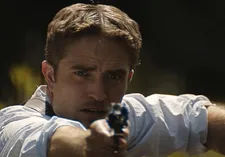 |
| Nathan Zellner on Robert Pattinson's role in Damsel: "The first part of the film is from Samuel's point of view. You're relying on him for all your information." |
NZ: Going back to the dancing sequence, that was always like we always thought that that was the happiest moment of the film for those two characters, whether it's a fantasy or not. So it's neat hearing that quote and how you can play it to like our most pleasant memory or whatever that sequence is.
It could be real or it could be in Samuel's head. It's neat hearing people who once they get to the end of the film they revisit different parts of it. But different takeaways or perception of it based on where we end up with it.
Read what David Zellner and Nathan Zellner had to say on Westerns, Butterscotch, and being epic in scope for Damsel.
Damsel is in cinemas in the US. The Karlovy Vary International Film Festival screenings are Saturday, June 30 at 12:30pm; Monday, July 2 at 7:00pm; Saturday, July 7 at 10:00pm








